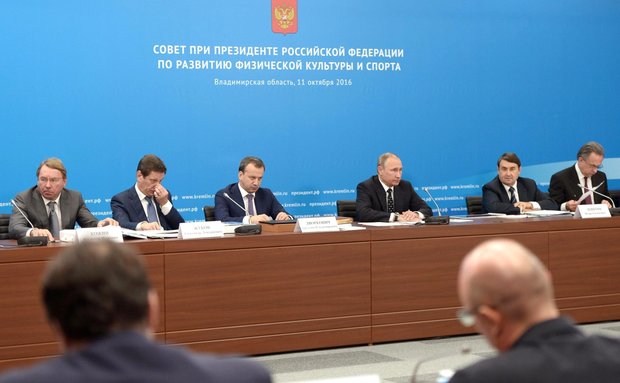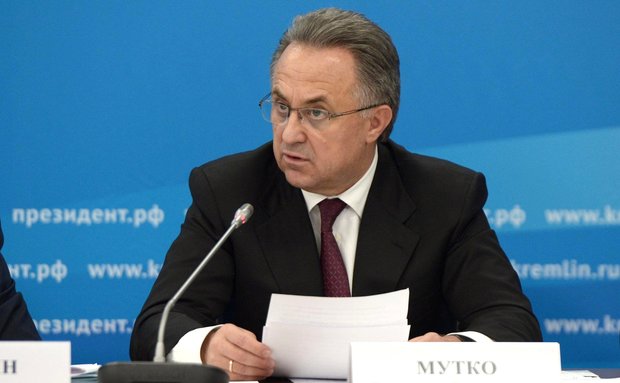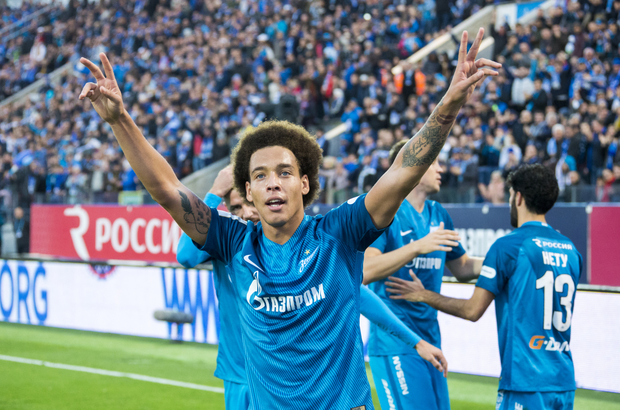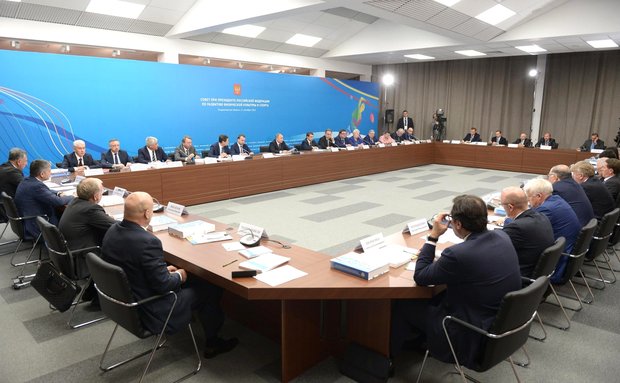Boom without noise: what we should wait from Putin’s statements on reduction of costs on professional sport
These days Vladimir Putin has made a statement about the participation of state companies in financing of sport. The most important word he uttered was that mass sport is to develop due to the optimisation of costs of regions and state companies on professional clubs. President asked the government to exam this question and analyse the costs. Realnoe Vremya tells whether we should take it too seriously and what would happen to Russian sport if President's intention becomes a reality.
There are problems, decision are expected
The history of statements about this problem has been systematic this year. Russia's President delivered speeches once in three or four months during 2015-2016. He overreacted to what he has reminded this week again. It is unclear why the head of the state has to remind it too much. Is it either the ineptitude of the Ministry of Sport in solving the existing problems quickly or an influence of the difficulty of making the plans real?
It all began in June 2015 or so when GTO programme [Editor's Note: All-Union physical culture training programme] was restored in the country. Over 1 billion rubles were expended in order to increase the population's interest in sport by developing GTO programme. Big plans needed big costs, and money was given. It seems it became an impetus for optimisation of state costs on the financing of professional sport. The federal budget, especially regional reserves, often spend unreasonably much money.
'First of all, the budgetary money and money of state companies should be expended mainly on mass sport, not on the purchase of foreign stars for the sake of prestige for unclear and often unreasonable prices, which, unfortunately, still happens here,' Vladimir Putin expressed his opinion on 2 June 2015.

There were enough similar speeches. It is unnecessary to go into details. This is why I will point out the main moments of his words. This kind of analysis will illustrate us our President's vision of the further development of professional sport in Russia. It is very topical in the light of the latest perturbations in sports cabinets. Probably someone will have a clue what is happening to our sport.
So, there are three important topics:
- Development of mass sport by enhancing the existing working conditions with young athletes
- Stop spending the state money on professional teams
- Make professional sport self-sufficient
This time Putin has directly told about the three problems and charged the government with solving them as soon as possible:
'I am convinced the financing of physical culture and mass sport needs to be increased by means of reduction of costs of regions and companies with the state participation on professional sport. We have told many times that professionals are able and ought to earn themselves. I am asking the government to analyse these costs of state companies and make corresponding proposals. This work should be gradual and neat, of course, in order to enjoy, not destroy everything. This plan is to be approved till the end of the year,' said Putin at the meeting of the Council for the Development of Physical Culture and Sport.
Are you ready for labour and defence?
The Ministry of Sport headed by Vitaly Mutko is the main executive entity of President's instructions. The Minister who has been criticised much in recent years doesn't cope with these tasks. For example, a football development plan called Startegy-2030, which has been presented recently, was to appear in November 2015. Due to the absence of this document, Putin even had to remind that he had to work on this issue.

Even if Mutko is constantly stating us about the opening of the nth centre of personnel preparation, our country doesn't notice real results. The image of a healthy lifestyle is still at the back of public mind, the population's interest doesn't augment. It not easy to say whether it is possible to solve these problems by restoration of GTO programme and opening of sports centres. Meanwhile, there are difficulties in financing at times. For example, the Governor of Penza Oblast stated a few days ago that sports venues ought to live on their own like we built, but you earn there.
By the way, the question about salary is interesting. A bad financing of mass sport was noted in one of Vladimir Putin's main ideas. He offers to regulate this problem due to a reduction of the costs on professionals with an opportunity to earn on athletes, not the common people. But it was not said how to do it. However, only optimisation of costs on expensive contracts of endless 'stars' can save much money.
Speaking about optimisation, we mean team sports. It is no secret that payslips of teams and their transfer appetites together with overrated fees of sports agents resemble one big bubble whose 'explosion' can enable to hit the jackpot in favour of mass sport. This is why it turns out that after the statement about a stricter control over the state participation in sport, at least a share of these costs is to fall.
In fact, President' request was ignored and, first of all, by the regions he counts on. Petersburg and Kazan were active during the transfer window in football and purchased a huge amount foreign players who perfectly fit the words Putin said once like 'for the sake of prestige for unclear and often unreasonable prices'. These teams can disagree, of course: de jure they are sponsored by private financing, but we know what money is meant de facto…

Life within your means or inevitable death
We would like the government of Russia to analyse the costs of regions and state companies on professional sport; it is another interesting moment we would like to pay attention to. A stress should be put on making the athletes and teams self-sufficient while solving this problem. Unlike the previous statement, this time the go-ahead to work on it has been given. There was some misunderstanding. For this reason, President's words can be interpreted differently.
First of all, it remains unclear whether the reduction in financing will be applied to only regional teams, or will it cover clubs from big cities too? The situation with backwater teams is quite clear. Volumes of sponsor money from the country remain decisive for the majority of them. Some of them live off the budget. Probably President's remark about a gradual transfer to private money refers to the interests of such clubs. However, the terms, which are to be met till the end of the year, question some sports collectives' further existence.
It will be curious to look whether this policy of double standards will be applied to this question. If the everything is clear concerning the regional clubs, the situation of Moscow and Petersburg clubs is not. For example, what should SKA and Zenit from Petersburg whose major sponsors are state companies do? Private companies among them are private only de jure. The same state of affairs at CSKA whose team sports collectives are sponsored according to the same scheme. Spartak also has to think it over. But do we have at least one oil non-state company? I don't think so. If the limitation doesn't cover all the teams, a good question arises whether the country needs this backwater sport. Or will we go towards the Soviet Union where clubs from big cities took the lead?
This decision will obviously be examined. And it is unlikely to increase the population's interest in sports facilities. But a postponement till the end is not a solution. The government will have to sweat over this question. Moreover, it is already clear that only a few of our leading clubs are able to become self-sufficient. At best. Professional sport in our country is likely to be unprofitable from the beginning because the population is insolvent, compared to developed countries of Europe and the world. In this case, it is not possible for a simple reason: contracts with players have been signed for a long period, and nonfulfilment of the obligations with a one-sided discontinuity of labour contracts spells a great number of legal actions for a tidy sum for our sport.

'Life within your means-2020'
The fate of our professional sport remains unclear. In fact, the state finds it unprofitable to destroy it. And the government is unlikely to lose one of the tools used to show positive results of its work. An unofficial request to increase the clubs' interest in the education of a younger generation and provide its financial independence by resale of athletes can become a solution.
Actually, there are many options. Professional sport's life can remain without changes or obtain a more advanced regime of work organisation. For example, a higher attendance of stadiums and Mutko's frequent mentioning of it insinuate a possible option. But it should be taken into account that optimisation ought to be gradual. It seems there is one solution – to adopt a plan for a gradual achievement of market relations according to the example of Strategy-2030. I have already made up its name: 'Life within your means-2020'.